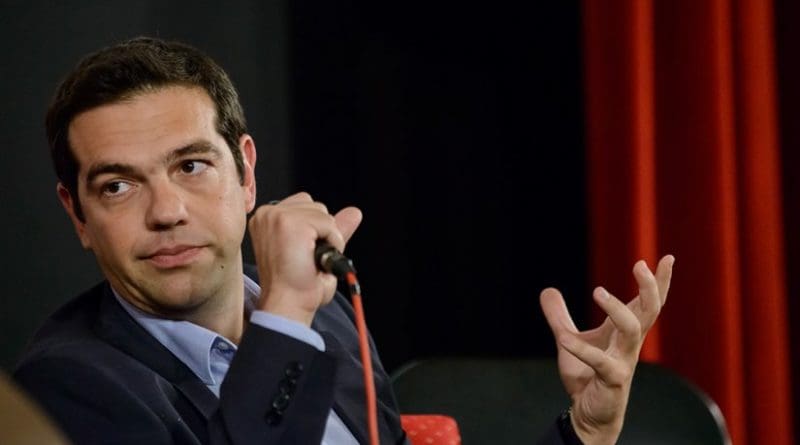Greece: All Passion Spent – OpEd
By Arab News
By Gwynne Dyer
Defending his decision to end his rebellion against the EU’s tough terms for bailing out Greek economy, Greek Premier Alexis Tsipras said, “We understood the responsibility to stay alive over choosing suicide.” He needed to defend it, since he finally gave in to even harsher terms. Sometimes defiance at all costs is a mistake. If Tsipras really knew he was going to lose his struggle with the EU eventually, shouldn’t he have settled earlier for better terms?
Back in mid-August, when Tsipras called the snap election that will be held this Sunday, he was still basking in the after-glow of the defiant “No” that Greek voters gave to austerity in his July referendum, and the opinion polls gave his Syriza party 42 percent support. At least Tsipras had stood up to the Germans and their rich allies in the EU, even if it meant that the banks closed for three weeks and the economy went into a nosedive.
But a lot of Greeks are having sober second thoughts. Tsipras’s quixotic battle with the EU killed what was starting to look like a modest outbreak of growth in the Greek economy and analysts are now predicting a further decline of up to four percent in Greek GDP this year. Unemployment is still at 25 percent (50 percent for young people). Was it all worth it?
Maybe not, and that thought may even have occurred to Tsipras by now. He was certainly very subdued in his television debate with Vangelis Meimarakis, leader of the New Democracy Party, last Sunday, and well he might be.
In the past six weeks, Tsipras’s own Syriza party has split, with 25 of its members of parliament forming a new Popular Unity party. They condemn him for accepting austerity and want Greece to quit the euro instead. They have taken a lot of Syriza’s former voters with them, so Syriza and the center-right New Democracy party are now neck-and-neck in the polls, with less than one percentage point between them.
That one percentage point matters a lot, since in Greek elections the party that wins the most seats is then given another 50 seats as a bonus. But even if Syriza is that party, it will still be very hard to form a new government after Sunday’s election.
Tsipras, like many, maybe most Greeks, wants to have his cake and eat it too. He wants to keep the euro, because he calculates that Greece would have to leave the EU if it went back to its old currency, the drachma. That is not technically inevitable, but most Greeks reckon it is very likely, and they desperately want to stay in the EU.
But neither Tsiras nor Greek voters want to live with perpetual austerity, which is probably the price of staying in the euro. Countries like Greece that have run up huge foreign debts usually deal with the problem by devaluing their currency, but there is no way for Greece to devalue the euro.
There is one way out of this dilemma, of course: Get your creditors to give you “debt relief.” If they would agree to cut the amount Greece owes by half, it could probably service the remainder of its debt and still grow its economy. In fact, that’s exactly what Christine Lagarde, managing director of the International Monetary Fund (IMF) told the eurozone finance ministers last month. The rich eurozone countries don’t want to do that, because other highly indebted members of the EU would then demand the same relief. If they refuse to do it for Greece, however, the IMF will not take part in the 86-billion-euro bailout of the Greek government and banks.
If the IMF won’t play, several EU parliaments (notably the German) may not ratify the deal, whose final details must be settled next month. But a solution will probably be found in the end, most likely by giving Greece a very long grace period, say 30 years, during which it only has to pay the interest, not the principal, on a large part of its debt.
But it’s increasingly unlikely that Tsipras will be the Greek prime minister who negotiates that deal — even though you could argue that it was really his defiance and brinkmanship that forced Greece’s creditors to consider such a deal at all.

